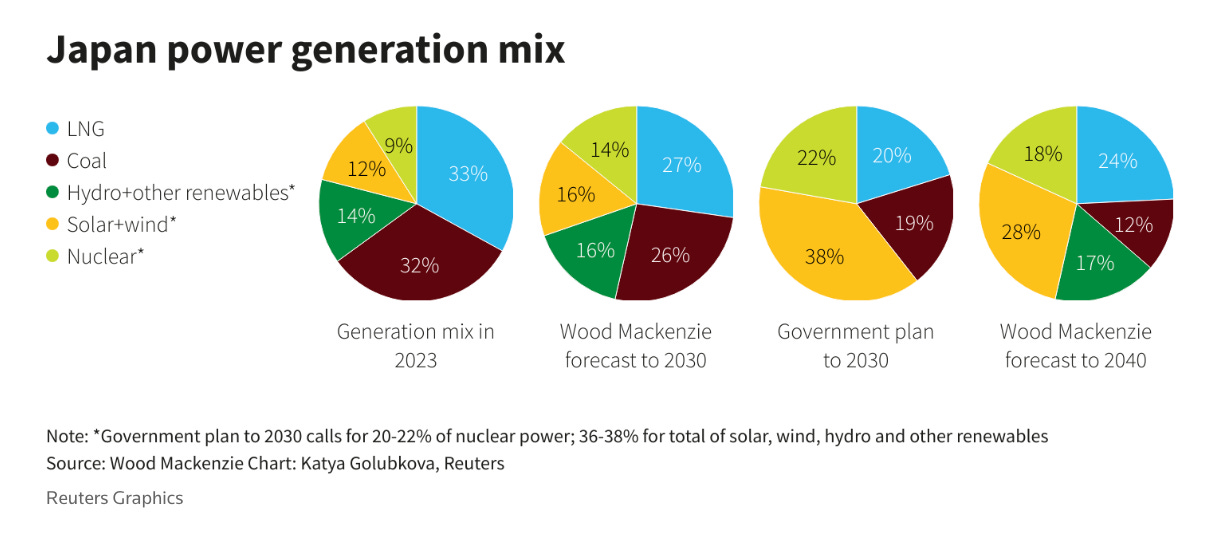*Editor’s note: This article was originally published on 6/4/2024 on Linkedin.
Welcome! I'm Hiroyasu Ichikawa, ichi, and this is issue 108 of the "Japan Climate Curation" newsletter📬, which curates Japan-related climate news content every week since spring 2022, with over 280 subscribers [ more than 2,320 on Linedin]. You can subscribe by clicking on the Linkedin page or the form below.
I hope you find the articles below beneficial for reading (or skimming)!
[🇯🇵📰👀Japan Climate News Headlines]
【1】In Japan, energy security fears put nuclear back in favor for 2040 plan [6/4 Reuters]
Japan plans to increase reliance on nuclear power in its 2040 energy policy update, seeking energy security and stable electricity supply.
The country faces challenges meeting its nuclear power targets due to regulatory hurdles, public opposition, high costs, and long development timeframes.
Accelerating renewable growth and reducing fossil fuel use will help achieve emissions reduction goals and lower energy prices.
【2】World’s Largest Nuclear Plant Sits Idle While Energy Needs Soar - Japan had big plans for nuclear power before the 2011 tsunami. Now, a debate over restarting its biggest facility will test whether it can turn away from costly imported fuels. [5/29 Bloomberg Green 🎁Gift URL]
Japan's Kashiwazaki Kariwa Nuclear Power Plant, the world's largest, remains idle due to safety concerns and lack of local support despite the country's need for stable, clean energy.
Restarting the plant is politically challenging, as residents bear the risks while Tokyo benefits and the Fukushima disaster has eroded public trust in nuclear power.
Japan must balance safety concerns with energy demands and climate targets. Momentum is building for a nuclear revival, but a clear policy and new reactors are needed for long-term success.
【3】Fukushima nuclear debris removal to begin as early as August - Crucial work at devastated plant has been delayed for three years [5/31 Nikkei Asia]
TEPCO announces a trial removal of melted fuel rods at the Fukushima Daiichi nuclear plant, which will begin between August and October. The highly radioactive debris will be collected using a fishing rod-like device, and the trial run is expected to take two weeks. Successful removal is critical for the decades-long decommissioning process.
【4】Japan auto safety scandal widens, Toyota halts some shipments [6/4 Reuters]
Toyota, Mazda, Honda, Suzuki, and Yamaha were found to have submitted incorrect or manipulated test data for vehicle certification. Toyota, Mazda, and Yamaha were ordered to suspend shipments of some vehicles; Toyota was ordered to undergo an on-site inspection. The scandal will likely heighten focus on Toyota's annual general meeting and proxy advisory firms' recommendations against re-electing Akio Toyoda as chairman.
【5】Tokyo exchange eyes expanded carbon credit trading by big companies - Japan market lags far behind similar efforts in China, South Korea [5/29 Nikkei Asia]
Tokyo Stock Exchange (TSE) aims to revitalize Japan's carbon credit market by making it easier for major companies with high emissions to participate starting in November.
Japan's carbon credit market lags behind similar efforts in China and South Korea, with only 310,000 tonnes traded on the TSE market since its opening in October.
The TSE will allow companies participating in the government's GX (Green Transformation) League to sell surplus credits if they reduce emissions beyond the national target.
【6】Japan electricity bills to jump as subsidies end [5/30 NHK World]
Households and smaller companies are bracing for another inflation jolt as the government switches off financial support.
【7】Japan companies to launch $1bn fund for hydrogen supply chains - Initiative to prioritize investments among IPEF countries [6/4 Nikkei Asia]
Over 400 Japanese companies, including Iwatani and major banks, aim to launch a $1 billion fund by September to strengthen hydrogen supply chains. The fund, operated by Advantage Partners, will invest in hydrogen production, storage, and transport, focusing on IPEF member countries.
【8】Japan plans 10 e-waste hubs to mine copper and metal resources - Mitsubishi Materials to join effort to prevent resources from being shipped abroad [6/2 Nikkei Asia]
Japan will invest 30 billion yen to set up 10 e-waste recycling hubs with companies like Mitsubishi Materials to secure valuable metals. The government targets recycling 500,000 tonnes by 2030 as global demand for copper and other metals soars due to decarbonization and digitalization.
【9】Offshore solar power tested out on Tokyo Bay with pilot projects - Sumitomo Mitsui Construction eyes future mega-solar plant at sea as land runs short [6/4 Nikkei Asia]
Tokyo Bay is becoming a test bed for offshore solar power in Japan. Sumitomo Mitsui Construction has installed a commercial offshore solar farm using its proprietary float system to withstand challenges like rough seas and salt damage. Despite higher costs, floating solar can significantly expand Japan's solar capacity.
【10】Japan’s push to make all research open access is taking shape - Japan will start allocating the ¥10 billion it promised to spend on institutional repositories to make the nation’s science free to read. [5/30 Nature]
Japan is pushing to make all publicly funded research open access by April 2025, becoming one of the first Asian countries to do so on a national scale. The government is investing in standardizing institutional repositories across universities, focusing on 'green OA' as 'gold OA' is too costly.
📬That's all for this week! Thank you for reading(or skimming) 🙇. I hope you will have a wonderful week ahead!
The "Climate Curation" newsletter in 🇯🇵Japanese (every Saturday) is available on Linkedin and Substack.
Please feel free to contact me via email: hiroyasu.ichikawa [@]socialcompany.org, if there are any research/consulting needs for your business or just for a coffee chat☕.
My personal Twitter(X) account (in 🇯🇵Japanese) @SocialCompany
ichi (Hiroyasu Ichikawa)






